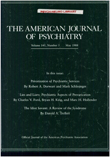The self-medication hypothesis of addictive disorders: focus on heroin and cocaine dependence
Abstract
Recent clinical observations and psychiatric diagnostic findings of drug-dependent individuals suggest that they are predisposed to addiction because they suffer with painful affect states and related psychiatric disorders. The drugs that addicts select are not chosen randomly. Their drug of choice is the result of an interaction between the psychopharmacologic action of the drug and the dominant painful feelings with which they struggle. Narcotic addicts prefer opiates because of their powerful muting action on the disorganizing and threatening affects of rage and aggression. Cocaine has its appeal because of its ability to relieve distress associated with depression, hypomania, and hyperactivity.
Access content
To read the fulltext, please use one of the options below to sign in or purchase access.- Personal login
- Institutional Login
- Sign in via OpenAthens
- Register for access
-
Please login/register if you wish to pair your device and check access availability.
Not a subscriber?
PsychiatryOnline subscription options offer access to the DSM-5 library, books, journals, CME, and patient resources. This all-in-one virtual library provides psychiatrists and mental health professionals with key resources for diagnosis, treatment, research, and professional development.
Need more help? PsychiatryOnline Customer Service may be reached by emailing [email protected] or by calling 800-368-5777 (in the U.S.) or 703-907-7322 (outside the U.S.).



